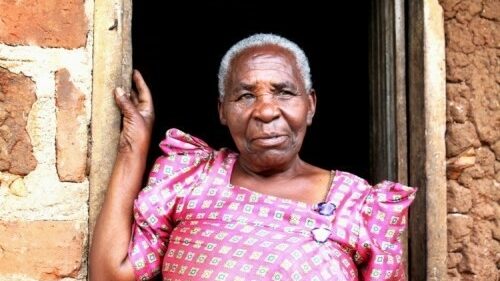Study Sheds New Light on Violence Against Ugandan Widows
Land Theft
New IJM research finds that nearly one of three widows in one area of Uganda is a victim of property grabbing—a devastating crime that threatens lives and livelihoods for some of the poorest and most vulnerable members of society.
Nearly 20% of these victims reported that attempts were made on their lives—and more than 30% reported threats against their children—by powerful neighbors or relatives trying to steal their homes or land.
The study also found that, although this violence against widows and orphans is common, little action has been taken from local authorities to stop it.
Read the full findings at IJM.org/studies.
IJM has been protecting victims of property grabbing in Uganda since 2008, and is working closely with local authorities and police to change these violent statistics and reduce the prevalence of this crime long-term.
How Violent Threats Terrified One Widow and Her Ten Grandchildren
Seventy-year-old widow Juliana endured more than a year of terrifying threats from a man intent on taking over her home and small grove of banana trees. He claimed that, as a woman, she had no rights to the land.
Juliana vividly remembers his violent threats: “If you don’t give me a portion of this land, blood is going to be spilled here. A person will die in this family.”
“I was very scared. I couldn’t eat or sleep,” Juliana later told her IJM social worker. “I feared that he was going to kill me, my daughter or my grandchildren.”
The threats against Juliana escalated throughout the year, until the man attacked Juliana with a machete and injured her in October 2014.
IJM came to her aid and worked with local police worked to arrest her attacker quickly. He has pleaded not guilty to the charges of violence and now waits behind bars for his trial to begin.
“When [he] was arrested, I was finally able to sleep again,” says the grandmother of ten. “I am confident that IJM will protect me.”
Equipping Police to Protect Widows and Reduce Crime
The quick action by local police in Juliana’s case represents a new shift in how the public justice system protects widows and orphans.
IJM’s study had found that more than half of property grabbing cases reported to the police included some form of violence—but little action was ever taken to stop the criminals. Many authorities in Uganda dismissed property grabbing as a “family matter” and sent widows away, which only left criminals free to terrorize vulnerable families more.
“Property grabbing is a violent crime,” says Kathryn Wilkes, Field Office Director of IJM Uganda. “When there aren’t immediate criminal consequences for property grabbing, violent attacks such as Juliana experienced will only continue.”
IJM will continue training and equipping local police in Mukono County to respond to cases of property grabbing. As more criminals go to jail and the community sees real consequences for this crime, IJM expects the overall prevalence of this violent crime to fall dramatically—so that widows like Juliana will remain safe.
Read more about IJM’s work in Uganda, or find this study and others at IJM.org/studies.